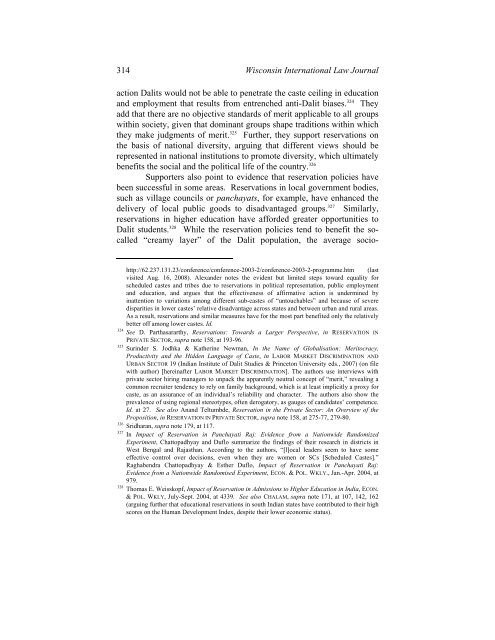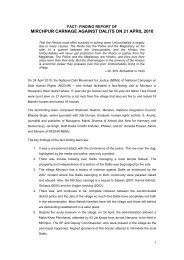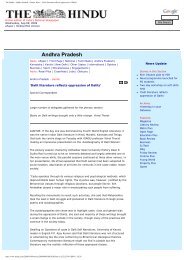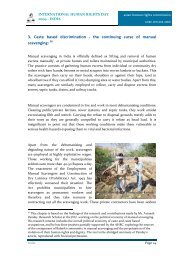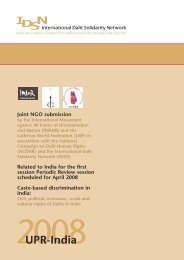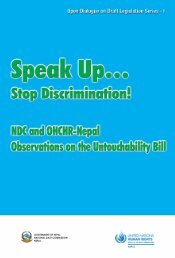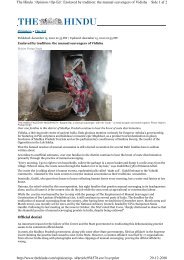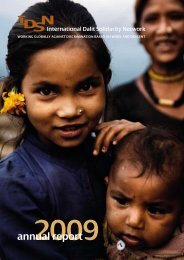equal by law, unequal by caste - International Dalit Solidarity Network
equal by law, unequal by caste - International Dalit Solidarity Network
equal by law, unequal by caste - International Dalit Solidarity Network
Create successful ePaper yourself
Turn your PDF publications into a flip-book with our unique Google optimized e-Paper software.
314 Wisconsin <strong>International</strong> Law Journalaction <strong>Dalit</strong>s would not be able to penetrate the <strong>caste</strong> ceiling in educationand employment that results from entrenched anti-<strong>Dalit</strong> biases. 324 Theyadd that there are no objective standards of merit applicable to all groupswithin society, given that dominant groups shape traditions within whichthey make judgments of merit. 325 Further, they support reservations onthe basis of national diversity, arguing that different views should berepresented in national institutions to promote diversity, which ultimatelybenefits the social and the political life of the country. 326Supporters also point to evidence that reservation policies havebeen successful in some areas. Reservations in local government bodies,such as village councils or panchayats, for example, have enhanced thedelivery of local public goods to disadvantaged groups. 327 Similarly,reservations in higher education have afforded greater opportunities to<strong>Dalit</strong> students. 328 While the reservation policies tend to benefit the socalled“creamy layer” of the <strong>Dalit</strong> population, the average sociohttp://62.237.131.23/conference/conference-2003-2/conference-2003-2-programme.htm(lastvisited Aug. 16, 2008). Alexander notes the evident but limited steps toward <strong>equal</strong>ity forscheduled <strong>caste</strong>s and tribes due to reservations in political representation, public employmentand education, and argues that the effectiveness of affirmative action is undermined <strong>by</strong>inattention to variations among different sub-<strong>caste</strong>s of “untouchables” and because of severedisparities in lower <strong>caste</strong>s’ relative disadvantage across states and between urban and rural areas.As a result, reservations and similar measures have for the most part benefited only the relativelybetter off among lower <strong>caste</strong>s. Id.324 See D. Parthasararthy, Reservations: Towards a Larger Perspective, in RESERVATION INPRIVATE SECTOR, supra note 158, at 193-96.325 Surinder S. Jodhka & Katherine Newman, In the Name of Globalisation: Meritocracy,Productivity and the Hidden Language of Caste, in LABOR MARKET DISCRIMINATION ANDURBAN SECTOR 19 (Indian Institute of <strong>Dalit</strong> Studies & Princeton University eds., 2007) (on filewith author) [hereinafter LABOR MARKET DISCRIMINATION]. The authors use interviews withprivate sector hiring managers to unpack the apparently neutral concept of “merit,” revealing acommon recruiter tendency to rely on family background, which is at least implicitly a proxy for<strong>caste</strong>, as an assurance of an individual’s reliability and character. The authors also show theprevalence of using regional stereotypes, often derogatory, as gauges of candidates’ competence.Id. at 27. See also Anand Teltumbde, Reservation in the Private Sector: An Overview of theProposition, in RESERVATION IN PRIVATE SECTOR, supra note 158, at 275-77, 279-80.326 Sridharan, supra note 179, at 117.327 In Impact of Reservation in Panchayati Raj: Evidence from a Nationwide RandomizedExperiment, Chattopadhyay and Duflo summarize the findings of their research in districts inWest Bengal and Rajasthan. According to the authors, “[l]ocal leaders seem to have someeffective control over decisions, even when they are women or SCs [Scheduled Castes].”Raghabendra Chattopadhyay & Esther Duflo, Impact of Reservation in Panchayati Raj:Evidence from a Nationwide Randomised Experiment, ECON. & POL. WKLY., Jan.-Apr. 2004, at979.328 Thomas E. Weisskopf, Impact of Reservation in Admissions to Higher Education in India, ECON.& POL. WKLY, July-Sept. 2004, at 4339. See also CHALAM, supra note 171, at 107, 142, 162(arguing further that educational reservations in south Indian states have contributed to their highscores on the Human Development Index, despite their lower economic status).


